via Treat & Retreat
When people think of serial killers, they think of all the brutal carnage these sick individuals were responsible for. Sure, this group of twisted psychopaths have become notorious for their violence and destruction, but what people may not be aware of is their capacity for artistic self expression. The term “murderabilia” refers to the profitable niche market wherein famous criminals can sell their handmade wares to people who want to own a piece of disturbing history. The ethical ramifications of purchasing artwork from a known murderer is irrelevant to these collectors. They are drawn to these paintings and drawings that offer a fascinating glimpse into the depths of human depravity.
Many states have enacted laws to prevent murderers from profiting off the notoriety of their crimes in the form of book deals and souvenir sales, so as to protect the dignity of their victims. That hasn’t stopped businesses like Serial Killers Ink, an online murderabilia retailer, from capitalizing on the public obsession with famous killers and their artwork. While these convicted killers serve their time behind bars, they pass the days making truly unsettling drawings and paintings that provide a creative outlet. As you will see below, there is no direct correlation between artistic talent and insanity. This sampling of artwork represents a pretty standard cross-section of amateur attempts, some having more natural ability than others.
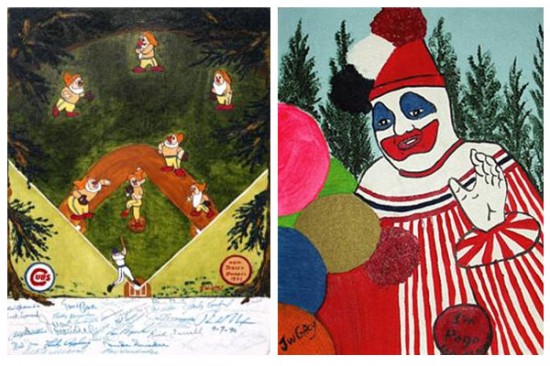
John Wayne Gacy
What could be creepier than clown paintings made by an actual killer clown? Convicted in 1980 for murdering 33 teenage boys and young men, John Wayne Gacy was executed by lethal injection in 1994. While he was on death row, the former clown performer would create paintings depicting his alter ego named “Pogo”. Another subject he favored in his artwork was the Seven Dwarves. In one painting called “Dwarf’s Baseball”, Gacy shows the dwarves playing a baseball game against the Chicago Cubs. To increase the value of this painting, an art dealer outside of prison took Gacy’s masterpiece to autograph conventions and had it signed by Baseball Hall of Famers like Ted Williams, Willie Mays, Mickey Mantle, and Joe Dimaggio (without telling them what it was they were signing).
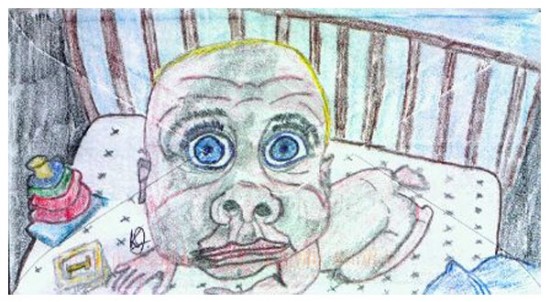
Keith Hunter Jesperson
Known as the “Happy Face Killer” for his signature happy face doodle on taunting letters to the media and law enforcement agencies, Keith Hunter Jesperson was responsible for the deaths of at least 8 women during the 1990′s. His daughter wrote a memoir detailing her disturbing childhood memories of her serial killer father. Jesperson’s drawing of an infant in the crib sends chills down the spine as the viewer imagines looking down at a defenseless child through the eyes of a cold-blooded murderer.
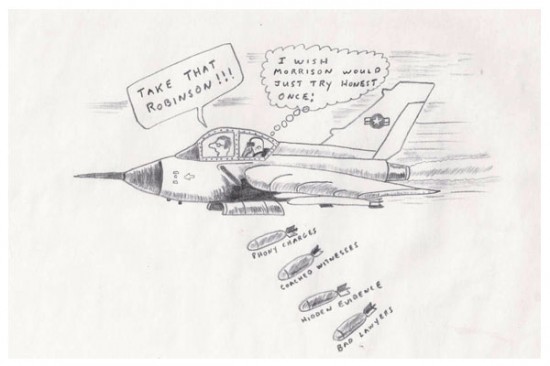
John Edward Robinson
A crooked businessman with a history of embezzlement, John Edward Robinson began murdering women in 1984. But Robinson would soon find a much bigger hunting ground when the internet was invented in the 1990′s. Calling himself “The Slave Master”, Robinson would meet victims online in BDSM chatrooms. He killed as many as 8 women before he was ultimately caught and imprisoned. Now he churns out one panel comics that express his feelings of unjust persecution at the hands of a biased legal system.
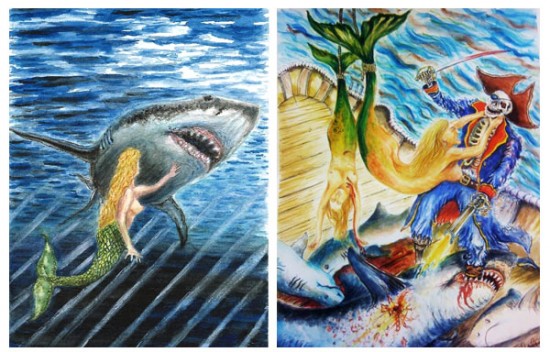
Charles Ng
After being dishonorably discharged from the U.S. Marine Corps, Charles Ng struck up a friendship with a man named Leonard Lake in 1983. Over the next two years, the pair tortured and murdered somewhere between 11 and 25 women in a secret bunker on Lake’s rural property in California. After being apprehended in Canada, Ng was extradited and sentenced to death. Still fighting his appeal, Ng spends his time on death row taking correspondence art classes. His paintings tend to depict maritime and underwater scenes, with a recurring theme of mermaids in peril.
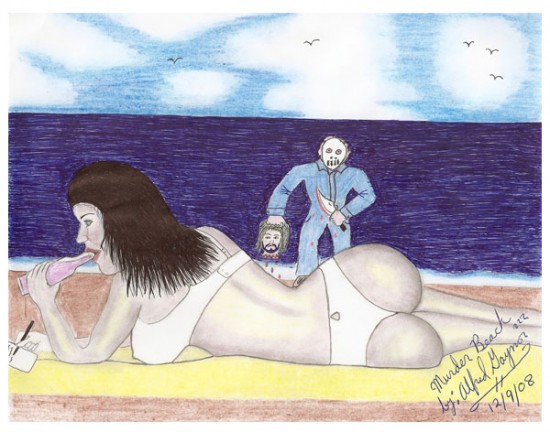
Alfred Gaynor
Between 1995 and 1998, Alfred Gaynor murdered at least 8 women in the Springfield, Massachusetts area. He was known to pose his victims in horrifying ways in order to make the discovery of their bodies as traumatizing as possible. This drawing of his, entitled “Murder Beach”, is exactly what one would expect to see coming from the mind of a serial killer who has been given a box of crayons and an abundance of free time.
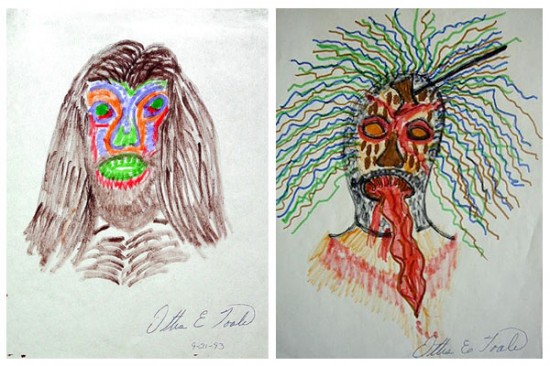
Ottis Elwood Toole
This notorious killer and arsonist was estimated to have killed somewhere between 6 and 65 victims during his reign of terror from 1961 to 1983. It has been said that he was the person responsible for the infamous 1981 murder of Adam Walsh, the little boy whose father (John Walsh) went on to create the show America’s Most Wanted to help bring other criminals to justice. These crude renderings of monster-like creatures are reminiscent of children’s drawings. Part of me wants to see them brought to life in the form of stuffed animals, like the children’s drawings over at Child’s Own Studios. The other part of me wants them erased from my memory entirely before they haunt my dreams forever.
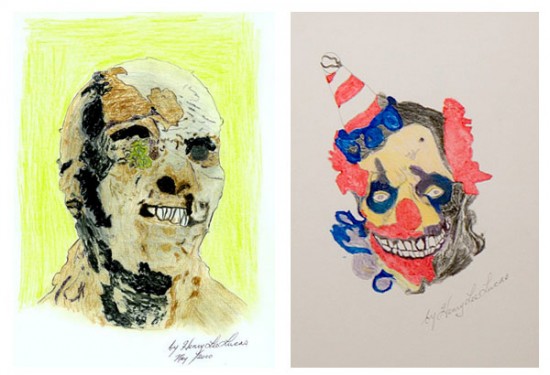
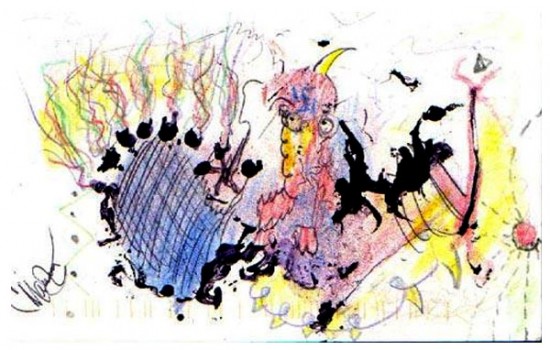
Charles Manson
Though technically Charles Manson never actually killed anybody, he was convicted of multiple murders through California’s “joint-responsibility” rule. He was the leader of a satanic hippie cult that perpetrated the 1969 murders of 7 people, including the pregnant actress Sharon Tate. Since he is well known for being musically inclined, it is no surprise that Manson also dabbles in the visual arts. His abstract compositions read as technicolor hellscapes from which his inner psyche cannot escape.
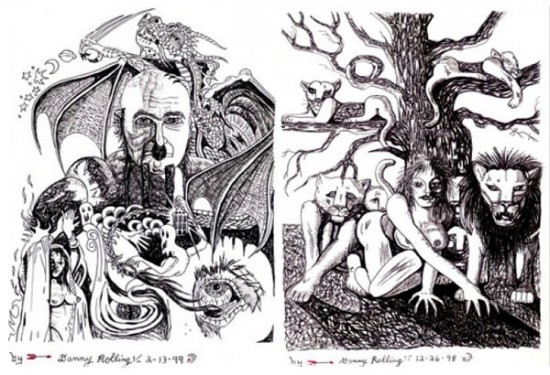
Danny Rolling
In August 1990, a series of gruesome murders terrified the community of Gainsville, Florida. Danny Rolling murdered 5 young women in their homes, then posed the bodies in shocking ways, much like Alfred Gaynor. Paying attention to the detail of a composition is something that is important to all artists, though generally it does not pertain to mutilated corpses. After authorities linked Rolling to the crimes, they also discovered that he was responsible for a triple homicide the previous year in Louisiana. Before he was executed in 2006, Rolling spent his time in prison creating black and white drawings of a dark fantasy world.
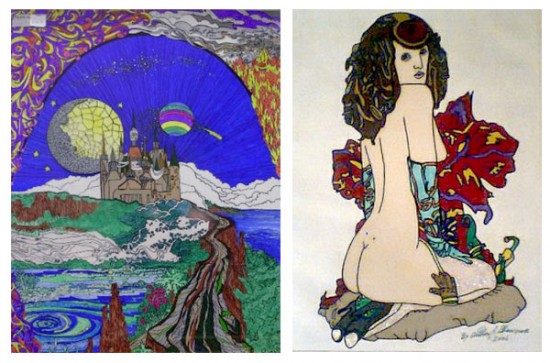
Arthur Shawcross
The story of Arthur Shawcross and his killing sprees demonstrates a spectacular failure on the part of the New York State justice system. In 1972, Shawcross murdered two children in Watertown, New York. He was caught and convicted of manslaughter for these atrocious crimes. Although he was sentenced to 25 years in prison, he ended up only serving 14 years before being paroled. He moved to Rochester to escape community outrage, where he began killing again. From 1988 to 1989, Shawcross murdered 12 women before being apprehended. He worked on colorful, art nouveau-style drawings before he died of a heart attack in 2008.






